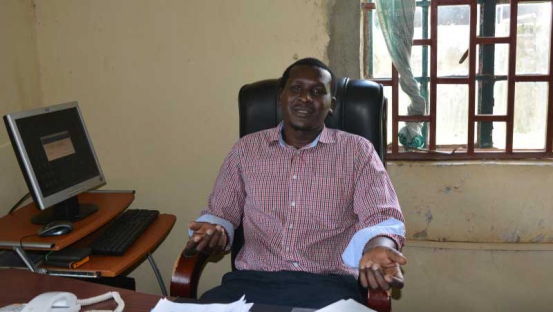
Dr Oliver Mamati, the doctor in charge of faith based Lugulu Mission Hospital in Bungoma County.
Dr Oliver Mamati had not shut his eyes before his phone rang. As the senior doctor on call that week, he knew it was a matter of life and death.
He dragged himself out of the house, turned on the car engine which was still warm since he had just come home a short while ago, and drove back to his station.
The medic, who doubles as the Chief Executive Officer of church-owned Lugulu Mission Hospital in Bungoma County, did not know what awaited him this early Sunday morning.
He was whisked straight into the maternity wing of the hospital, through to the tiny, poorly lit hospital theatre where he found a dozen women being readied for caesarean sections.
Dr Mamati had already lost too many children and mothers in the previous weeks and could not afford any new deaths.
Wheeled in
With the skill of a surgeon, he operated one mother as the next one waited on the wings to be wheeled in.
He hardly saw the sun rise and was not out of the theatre before it set. He had never done so many caesarean sections in one day.
But this day was just a preparation for many similar days and nights that would come in the course of the year as his peers in public hospitals downed their tools.
A caesarean section, which is abbreviated C-section, is a surgical delivery of a baby through making incisions in the mother’s abdominal wall and uterus.
At this hospital, C-sections are not done unless it is a medical emergency.
Lugulu Hospital is not the kind of place a son of a local politician would want to walk in for treatment.
Most of the facilities at the hospital have seen better days having been in use for decades. The hospital has been largely relying on the donations from the Friends Church and some well-wishers to keep it afloat.
There are no luxuries here. Every the walls appear to be screaming, hoping to get a fresh coat of paint.
There are hardly half the number of beds it needs to manage its traffic. Shifts for medics here are no longer useful because most have been permanently on duty, only rushing home to freshen up before the dreaded call comes through to request them back to work.
The facility inherited the role of a referral hospital in Bungoma County following protracted doctors and nurses’ strikes. These rotational strikes have cumulatively made public hospitals nonfunctional for more than 200 days.
Lugulu Hospital, as ill-equipped as it is, had to inherit the health burden of almost half the third most populous county in Kenya.
Pain and agony
None of the patients cared that Mamati had just left the hospital a few hours earlier, had hardly slept for three days nor wanted to know just how exhausted his team was having been stretched to the limit.
“They come in sick and most of the time when they have tried elsewhere and it has failed. They just want to see a doctor in his white coat to deal with the emergency,” Mamati narrates.
The pain etched on their faces and the pacing of husbands of expectant mothers around the hospital corridors was enough to tell him that he had to put in his all or he would be wheeling more bodies to the mortuary.
By the time he was on the eleventh case, his head was dizzy from the sound of the scalpel, knocking against each other on the tray.
The only thing that kept him going was the burst of joy from grateful parents as screams of newborns crying for the first time rent the air, to mark another successful delivery.
It was after he was done, that he realised just how exhausted he was. He walked into his office across the hospital, sunk into his black chair facing an old personal computer on his desk, and tried to close his eyes, but he couldn’t get sleep.
Doctors at his hospital were now doing three times more deliveries than normal. For instance, between May and June, there were 166 deliveries up from the monthly average of 56. There was a month there were 218 deliveries, half of them being caesarian sections.
Lugulu Mission Hospital is just a mirror of the burden that hundreds of faith-based facilities have had to carry as the nurses strike completes its fourth month. The strikes are threatening to reverse the gains the country has made in fighting maternal mortality rate.
“We had never lost any baby for a long time, but during this strike, we lost at least 30 children and six mothers,” Mamati said.
Mamati explains that most of the patients that turn up in their maternity section come with serious complications.
Two-thirds of caesarean sections in Kenya are usually performed in government facilities. However, during the strike this dropped to one fifth, and the faith-based and private facilities have had to perform around 80 per cent of the country’s caesarean sections.
Herein lies the problem because most of these facilities are yet to be placed on the free maternity programme. This has forced patients to go back to their pockets to fund the deliveries.
Data from District Health Information Software (DHIS) shows that typically, over 80 per cent of institutional deliveries within Kenya occur in government facilities. However, due to the doctors’ and nurses’ strikes strike this dropped to about 50 per cent from December 2016.
In contrast, faith-based and private facilities saw their share of total deliveries rise from 20 per cent in November 2016 to 50 per cent. The report notes that between January and October 2016 Faith Based Organisations (FBO) and the private sector conducted an average of 3,600 caesarean sections per month.
As a result of the doctors’ strike, the FBO/private sector are conducting over double the number of caesarean sections compared to what they usually do (7,600 in December 2016 and 7,850 in January 2017), the DHIS data shows. DHIS is Kenya’s health information system.
Worse, the total number of caesarean sections per month in Kenya has reduced during the strike, from 13,300 in November 2016 to 9,800, suggesting that women who need a caesareans may not be able to access them.
This has seen more deaths shift from public to private facilities. For example, in September last year, eight out of every ten still births were happening in government facilities with private and faith based units each accounting for one in every ten.
By January, the ratio had changed significantly with only four of the deaths happening at the few government facilities that were in operation. This has seen two deaths in every ten happening at faith based units while the private facilities accounted for the remaining four deaths in every ten.
The trend is the same when it comes to neonatal deaths where 91 per cent were happening in government facilities as patients rushed to benefit from the free maternity programme. With the strikes and patients moving to private and health based facilities, 66 per cent of the neonatal deaths are now happening at non-governmental facilities.
Before the strike, majority of the still births and neonatal deaths were occurring in the government facilities but the trend was reversed during the strike period as more clients were visiting the private and faith-based facilities,” the report shows.
“The capacity to handle the volume of clients in these facilities could have limited the quality of care and hence more mortalities,” the report adds.
But the untold story is the impact of this on slowing down the gains made from the free maternity programme.
The fact that most these women had been registered to be part of the Free Maternity Programme has transferred the cost to the private facilities. Many are being detained because of not being able to pay. The clients being unable to pay mean that facilities are struggling to find the resources to cover their needs despite staff being overworked and exhausted.
On the day we visit Lugulu Hospital, Dr Mamati had just come from a meeting where the hospital had formed a committee to investigate the genuine cases who can demonstrate that they cannot pay and be released without charge and the rest asked to pay a nominal fee. There was no point in keeping patients in the hospital any longer.
“We are not a profit-making institution, but we charge small fees to be sustainable,” Dr Mamati says.
He says the previous county administration owed the hospital more than Sh10million in refunds. The development has slowed down the impact of the Free Maternity Programme on reducing the maternal mortality maternity rates.
The Government has been running the programme for more than a year, and this programme is limited to public hospitals. Before the strike, the National Government had moved to scale up the programme to some faith-based medical facilities. Given the publicity that the government has given on the programme, few patients understand that not all hospitals are covered under the programme. Lugulu Mission Hospital is not among the hospitals on the programme. In fact, in Bungoma County, there is no hospital under the programme.
A new problem for these hospitals is how to deal with patients who cannot pay the nominal fees these faith-based units charge.
 The Standard Group Plc is a multi-media organization with investments in media platforms spanning newspaper print
operations, television, radio broadcasting, digital and online services. The Standard Group is recognized as a
leading multi-media house in Kenya with a key influence in matters of national and international interest.
The Standard Group Plc is a multi-media organization with investments in media platforms spanning newspaper print
operations, television, radio broadcasting, digital and online services. The Standard Group is recognized as a
leading multi-media house in Kenya with a key influence in matters of national and international interest.











